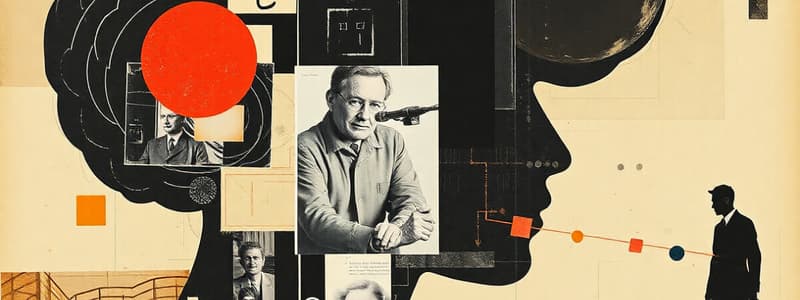Podcast
Questions and Answers
Which psychological perspective emphasizes the impact of unconscious conflicts on behavior and mental processes?
Which psychological perspective emphasizes the impact of unconscious conflicts on behavior and mental processes?
- Humanistic
- Psychodynamic (correct)
- Cognitive
- Behavioral
A researcher is studying how specific brain structures influence decision-making. Which psychological perspective aligns most closely with this research?
A researcher is studying how specific brain structures influence decision-making. Which psychological perspective aligns most closely with this research?
- Neurobiological/Physiological (correct)
- Humanistic
- Psychodynamic
- Behavioral
Which perspective in psychology focuses on observable actions and the role of environmental stimuli in shaping behavior?
Which perspective in psychology focuses on observable actions and the role of environmental stimuli in shaping behavior?
- Humanistic
- Cognitive
- Psychodynamic
- Behavioral (correct)
A psychologist is investigating how people encode, store, and retrieve information. Which perspective is guiding this psychologist's research?
A psychologist is investigating how people encode, store, and retrieve information. Which perspective is guiding this psychologist's research?
Which of the following best describes the focus of the humanistic perspective in psychology?
Which of the following best describes the focus of the humanistic perspective in psychology?
A researcher aims to understand a patient's depression by considering their genetic predispositions, thought patterns, and social environment. Which approach is the researcher using?
A researcher aims to understand a patient's depression by considering their genetic predispositions, thought patterns, and social environment. Which approach is the researcher using?
After reading about a study's results, John exclaims, "I knew that would happen!" even though he wouldn't have predicted the outcome beforehand. This is an example of which concept?
After reading about a study's results, John exclaims, "I knew that would happen!" even though he wouldn't have predicted the outcome beforehand. This is an example of which concept?
A researcher conducts a survey to study people's opinions on a new policy. What is a primary benefit of using this descriptive research method?
A researcher conducts a survey to study people's opinions on a new policy. What is a primary benefit of using this descriptive research method?
Which goal of psychology is best exemplified by a researcher designing an intervention to help individuals overcome anxiety?
Which goal of psychology is best exemplified by a researcher designing an intervention to help individuals overcome anxiety?
How did William James's functionalism differ most significantly from Wilhelm Wundt's structuralism?
How did William James's functionalism differ most significantly from Wilhelm Wundt's structuralism?
Which statement best reflects the core belief of the behaviorist perspective, as championed by John Watson and B.F. Skinner?
Which statement best reflects the core belief of the behaviorist perspective, as championed by John Watson and B.F. Skinner?
A therapist who emphasizes the importance of early childhood experiences and unconscious conflicts is likely following which perspective?
A therapist who emphasizes the importance of early childhood experiences and unconscious conflicts is likely following which perspective?
Which of the following best describes the neurobiological approach to psychology?
Which of the following best describes the neurobiological approach to psychology?
A psychologist is investigating the impact of a new drug on reaction time by measuring changes in brain activity. Which approach is the psychologist most likely using?
A psychologist is investigating the impact of a new drug on reaction time by measuring changes in brain activity. Which approach is the psychologist most likely using?
Which situation exemplifies the application of the psychodynamic approach to understanding behavior?
Which situation exemplifies the application of the psychodynamic approach to understanding behavior?
Which of the following reflects a key difference between the behavioral and psychodynamic perspectives?
Which of the following reflects a key difference between the behavioral and psychodynamic perspectives?
A researcher observes that students who spend more time studying tend to get better grades. However, they cannot conclude that increased study time causes better grades. Which of the following is the primary reason for this limitation?
A researcher observes that students who spend more time studying tend to get better grades. However, they cannot conclude that increased study time causes better grades. Which of the following is the primary reason for this limitation?
In an experiment examining the effect of a new drug on reaction time, participants are randomly assigned to either receive the drug or a placebo. What is the purpose of this random assignment?
In an experiment examining the effect of a new drug on reaction time, participants are randomly assigned to either receive the drug or a placebo. What is the purpose of this random assignment?
A study aims to investigate the impact of violent video games on aggressive behavior in teenagers. Which of the following poses the most significant ethical challenge in designing this experiment?
A study aims to investigate the impact of violent video games on aggressive behavior in teenagers. Which of the following poses the most significant ethical challenge in designing this experiment?
A researcher wants to study the sleep patterns of college students. She defines 'sleep duration' as the number of hours recorded by a sleep-tracking device worn on the wrist. This is an example of:
A researcher wants to study the sleep patterns of college students. She defines 'sleep duration' as the number of hours recorded by a sleep-tracking device worn on the wrist. This is an example of:
Which correlation coefficient indicates the strongest relationship between two variables?
Which correlation coefficient indicates the strongest relationship between two variables?
In an experiment studying the effect of caffeine on test performance, one group of participants receives a caffeinated beverage, while the other group receives a non-caffeinated beverage. The test scores are then compared between the two groups. What is the independent variable in this experiment?
In an experiment studying the effect of caffeine on test performance, one group of participants receives a caffeinated beverage, while the other group receives a non-caffeinated beverage. The test scores are then compared between the two groups. What is the independent variable in this experiment?
An experiment is conducted to determine if a new fertilizer increases tomato yield. One group of tomato plants receives the new fertilizer (experimental group), and another group receives no fertilizer (control group). What is the dependent variable in this experiment?
An experiment is conducted to determine if a new fertilizer increases tomato yield. One group of tomato plants receives the new fertilizer (experimental group), and another group receives no fertilizer (control group). What is the dependent variable in this experiment?
A researcher wants to gather data that is representative of all undergraduate students at a large university. Which sampling method would be most effective in achieving this goal?
A researcher wants to gather data that is representative of all undergraduate students at a large university. Which sampling method would be most effective in achieving this goal?
Flashcards
What is Psychology?
What is Psychology?
The scientific study of behavior and mental processes.
Goals of Psychology
Goals of Psychology
To measure, describe, explain, predict, and control/alter behavior and mental processes.
William Wundt
William Wundt
Opened the first psychology lab and used structuralism.
William James
William James
Signup and view all the flashcards
John Watson
John Watson
Signup and view all the flashcards
B.F. Skinner
B.F. Skinner
Signup and view all the flashcards
Sigmund Freud
Sigmund Freud
Signup and view all the flashcards
Neuro-biological Approach
Neuro-biological Approach
Signup and view all the flashcards
Descriptive Research
Descriptive Research
Signup and view all the flashcards
Correlational Research
Correlational Research
Signup and view all the flashcards
Random Assignment
Random Assignment
Signup and view all the flashcards
Control Group
Control Group
Signup and view all the flashcards
Independent Variable (IV)
Independent Variable (IV)
Signup and view all the flashcards
Dependent Variable (DV)
Dependent Variable (DV)
Signup and view all the flashcards
Correlation Coefficient
Correlation Coefficient
Signup and view all the flashcards
Operational Definition
Operational Definition
Signup and view all the flashcards
Behaviorism
Behaviorism
Signup and view all the flashcards
Neurobiological/Physiological Perspective
Neurobiological/Physiological Perspective
Signup and view all the flashcards
Psychodynamic Perspective
Psychodynamic Perspective
Signup and view all the flashcards
Behavioral Perspective
Behavioral Perspective
Signup and view all the flashcards
Critical Thinking
Critical Thinking
Signup and view all the flashcards
Hindsight Bias
Hindsight Bias
Signup and view all the flashcards
Overconfidence
Overconfidence
Signup and view all the flashcards
Descriptive Methods
Descriptive Methods
Signup and view all the flashcards
Study Notes
- Psychology is the scientific study of behavior and mental processes.
- The goals of psychology are to accurately measure, describe, explain, predict, and control/alter behavior and mental processes.
The Story of Psychology
- William Wundt was the first person to call himself a psychologist.
- Wundt opened the first psychology laboratory in Germany at the University of Leipzig.
- Wundt's approach was called Structuralism, and he looked inward on experiences to determine how they relate.
- William James was an American influenced by Darwin, he supported Functionalism.
- Functionalism involves interest in the adaptive functions served by behavior and thought.
- James was the first classroom teacher of psychology and wrote the textbook "Principles of Psychology".
- John Watson championed psychology as the science of behavior and demonstrated conditioned responses on a baby, supporting behaviorism.
- B.F. Skinner was a behaviorist who rejected introspection and studied how consequences shape behavior.
- Sigmund Freud emphasized how emotional responses to childhood experiences and unconscious thought processes affect behavior.
- Psychology until the 1920s was defined as "the science of mental life" due to Freud.
Psychological Perspectives
- Neuro-biological/Physiological perspective suggests behavioral and mental processes are explained by the nervous system's activities, the brain, and the action of hormones, neurotransmitters, and other chemicals.
- Psychodynamic perspective says behavior stems from unconscious drives and conflicts.
- Behavior and mental processes are largely determined by unconscious mental and emotional conflicts.
- Instincts or desires for sex, aggression, security, and power are pitted against environmental obstacles.
- Key figures in the psychodynamic perspective include Horney, Erikson, and Freud.
Different Approaches to Psychology
- Structuralism uses introspection to explore the structural elements of the human mind and was the first formal school of psychology, begun by Wilhelm Wundt.
- Functionalism focuses on how mental and behavioral processes function to enable adaptation, survival, and flourishing, begun by William James.
- Behaviorism states that science should be objective and study behavior without reference to mental processes.
- The psychodynamic perspective, founded by Freud, suggests that behavior and mental processes are largely determined by unconscious mental and emotional conflicts.
- The behavioral perspective states that psychology can be studied scientifically by examining overt behavior, which is shaped by the patterns of punishments experienced.
- The cognitive perspective says behavior is determined by how information is encoded, stored, retrieved, or processed by the brain.
- Humanistic perspective emphasizes the growth potential of healthy people and the individual's potential for personal growth, where humans make choices by thinking rather than environmental influence.
- The biopsychosocial model incorporates various levels of analysis for a complete picture of behavior/mental processes.
Thinking Critically
- Critical thinking does not blindly accept arguments and conclusions, but examines assumptions, discerns hidden values, and evaluates search methods.
- It also involves observation of the effect on some behavior or mental process via independent variables.
- Hindsight bias is the feeling you 'knew it all along' after hearing results.
- Overconfidence makes the answer seem obvious after its discovery.
Research Methods
- Steps in the Scientific Method include identifying a question of interest, posing a testable hypothesis, and conducting a study to test the hypothesis.
Research Methods: Benefits and Drawbacks
- Descriptive methods involves case studies, surveys, and naturalistic observation.
- They allow observation and description of things in everyday life with the drawback of the inability to change factors plus data may be misrepresented, and there is no control of variables.
- Correlational: Benefits include helping to figure out how closely two things vary together and to predict the other variable.
- The drawback is indication of the possibility of a cause-effect relationship, but it does not prove causation.
- Experimental: Benefits include the ability to draw cause and effect interferences while controlling variables with a control group.
- Drawbacks involve the inability to ethically manipulate certain variables, and results may not generalize to other contexts.
- Random assignment controls for other relevant factors by assigning participants to experimental and control groups by chance, thus minimizing pre-existing differences.
- A control group is NOT exposed to the treatment, serves as a comparison for evaluating the effect of the treatment.
- The independent variable (IV) is the factor that is manipulated and variable whose effect is being studied.
- The dependent variable (DV) is the outcome factor, and its variable may change based on the manipulations of the independent variable.
- Correlation is a measure of the extent to which 2 factors vary together
- Correlation Coefficient is a statistical index of the relationship between 2 things (ranges from -1 to +1).
- The absolute value of the number indicates the strength of the relationship, a correlation of 0 means there is no relationship and the sign indicates direction of relationship
- A random sample fairly represents a population.
- Operational Definition – a statement of procedures (operations) used to define research variables, select research method, collect and analyze data, interpret and publish results.
- An experiment is an organized way to prove or disprove a hypothesis derived from observations.
- The experiment is the only method through which causal relationships can be studied, and involves manipulation of one variable.
- Research ethics involves IRB and human subjects' ethical approval, informed consent, weighing potential harms vs. potential benefits of research and ethical guidelines for animal research.
Studying That Suits You
Use AI to generate personalized quizzes and flashcards to suit your learning preferences.




